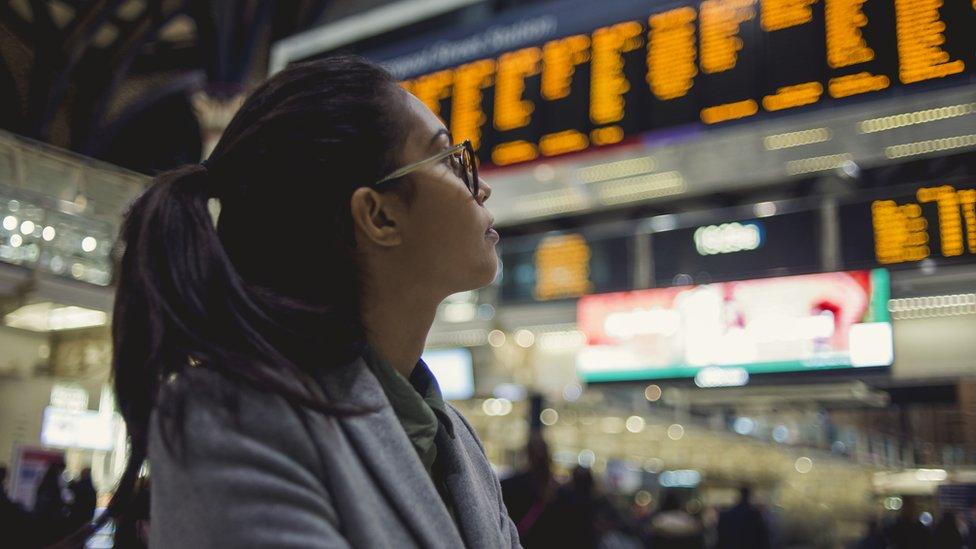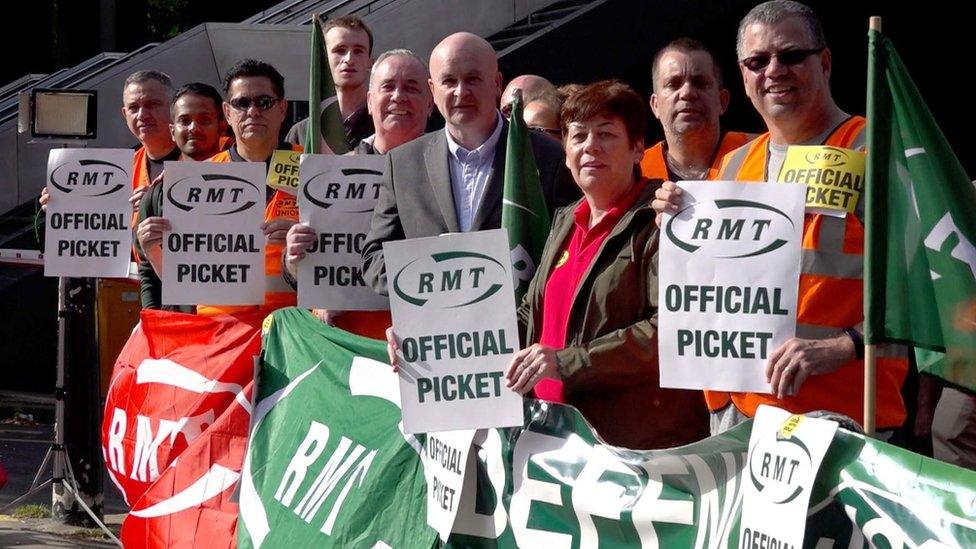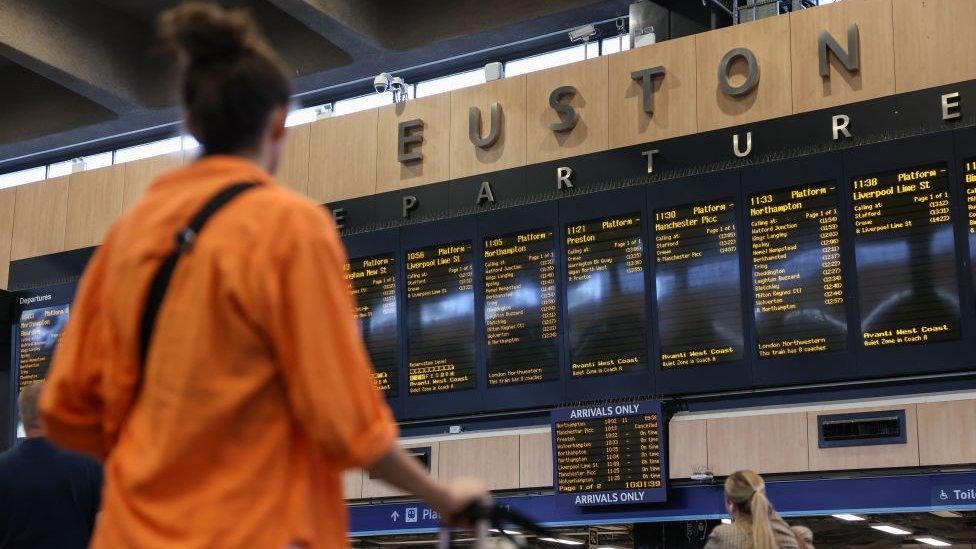Train strikes: 'I'm missing the football because I can't get there'
- Published

Thomas De Fraye can't get to Wednesday's Euro 2022 semi-final because of the train strike.
Thomas De Fraye from north London was looking forward to the Women's Euro 2022 semi-final between Germany and France in Milton Keynes - but now can't get there because of the rail strikes.
"I was going to go after work," he said. "Now there are no trains."
The disruption comes as 40,000 RMT union members at Network Rail and 14 train companies take part in a fresh strike over pay, jobs and terms.
Only 20% of train journeys are expected to go ahead on Wednesday.
Mr De Fraye said he booked his ticket for today's Women's Euro 2022 semi-final "many months ago, before there was any news about strikes".
He does not drive and a bus would not get him there in time for kick-off.
"I live in Enfield so it's not even that far so I was going to go after work," said the 27-year-old.
"Now there are no trains running and an Uber would cost me £90 one way. That price would surely increase on the day due to demand and I have to get back too."
Mr De Fraye gave his ticket away on Twitter. "If I can help someone else go there that makes me happy," he said.
The Department for Transport said the RMT was "hell-bent on creating further misery for passengers across the UK".
But the RMT accused Transport Secretary Grant Shapps of not allowing the rail industry to do a deal with the union.
Network Rail chief executive Andrew Haines said, despite its best efforts to find a breakthrough, there would be more rail disruption due to strikes.
In addition to the members of the RMT, members of the Transport Salaried Staffs' Association (TSSA) at Avanti West Coast, which operates some trains to Birmingham, are also striking on Wednesday.
The knock-on effects of the disruption are expected to roll in to Thursday, Network Rail said.
Separately, on Saturday, about 5,500 members of the train drivers' union Aslef at seven rail companies will strike.
Further RMT strikes are also planned for 18 and 20 August, with London Underground staff planning to strike on 19 August.

The Prime Minister's official spokesman had urged the RMT union to call off the strikes, saying on Tuesday No 10 was concerned about the impact the action would have "on the public going about their everyday lives".
Places including Blackpool, Portsmouth and Bournemouth have no train services at all and elsewhere people are being told only to travel by train if necessary.
Network Rail has published a special timetable, external for Wednesday, with trains starting later and finishing earlier than usual, between 07:00 and 18:30 BST.
Passengers are being warned that the last trains from London will leave for Edinburgh at 14:00, for Birmingham at 15:43 and Manchester at 15:40.

Network Rail's Andrew Haines said he could "only apologise for the impact this pointless strike" would have on passengers, "especially those travelling for holidays or attending events such as the Uefa Women's Euro 2022 semi-final and the opening ceremony of the Commonwealth Games [on Thursday]".
Network Rail said its latest pay offer was worth more than 5%, but that it depended on workers accepting "modernising reforms". However, the RMT union said this was a "paltry sum" and represented "a real-terms pay cut".

RMT general secretary Mick Lynch, centre, stood at picket lines during the first round of strikes in June
RMT general secretary Mick Lynch said: "The Department for Transport controls the 14 train operators we are in dispute with and Network Rail is a publicly-owned company who does not have the final sign-off on any deal. That lies with the Secretary of State for Transport.
"We will continue to talk to the employers but there remains a huge chasm between us around pay, job security and working conditions."
A Department for Transport spokesperson said: "RMT's actions will affect people in need of urgent care, hardworking families off on long-awaited holidays and day trips, and businesses."
'It's a joke'
Student Blessing-Nicole Yanda from Watford was due to get the train to Birmingham City University to give a presentation as part of her digital marketing degree.

Blessing-Nicole Yanda is missing a university presentation due to the strikes.
Now she cannot get there and has added it to the list of lectures missed due to the first round of strikes in June.
"The uni have said that although I can present online, there is nothing they can do regarding my attendance record," she said.
Miss Yanda, 19, is on a fast-track course that continues through the summer but she had to leave her student accommodation as it is used for the Commonwealth Games. She moved home to Watford as she also performs gigs in London to earn money while she studies.
"I rely on the train heavily as all my performances are in London. It's only an hour between Birmingham and London so I can travel between the two.
"It's so expensive getting on the train even with a student rail card. I spend £100 a week easily in a week, it's a joke.
"Rail workers get so much money and it's affecting other people's lives who can't get to work because of the strikes."
'I had no idea about the strikes here'
Not everyone had heard about the strike or made alternative travel plans.
Rail commuter Talisha told the BBC she usually gets the 08:23 train to Chorley, for her job in a store there.

Talisha arrived at the station to find her train wasn't running
She did not know about Wednesday's industrial action, and turned up to find her train wasn't running.
"I had no idea about the strikes here. It set me back a bit this morning."
"I'm planning on getting the bus possibly, but if that's not happening I won't be getting to work today".


It's already turned into an unhappy summer on the railway.
This is the fourth day of national RMT strikes within five weeks.
Without a significant breakthrough in talks, more will follow next month.
Right now, it's hard to envisage that breakthrough happening soon - although all sides say they want to keep talking.
Negotiations between the RMT and Network Rail appeared to have made progress, before a stalemate emerged.
Things haven't even got to a pay offer with train companies - which say reforms need to be agreed first.
And other transport unions have industrial action in the diary too.
Many people can now work from home, meaning strikes don't affect some commuters in the same way they used to.
But, especially in the summer holidays, plenty of people will find their leisure plans disrupted - or find themselves forced to drive at a time when fuel prices are still high.
There are other effects too, including concern among some rail freight businesses that customers will be put off moving goods off the roads and on to the rails.


How will the rail strikes affect your journey? What alternative forms of transport are you using? Share your experiences by emailing haveyoursay@bbc.co.uk, external.
Please include a contact number if you are willing to speak to a BBC journalist. You can also get in touch in the following ways:
WhatsApp: +44 7756 165803
Tweet: @BBC_HaveYourSay, external
Please read our terms & conditions and privacy policy
Related topics
- Published9 May 2024

- Published26 July 2022
